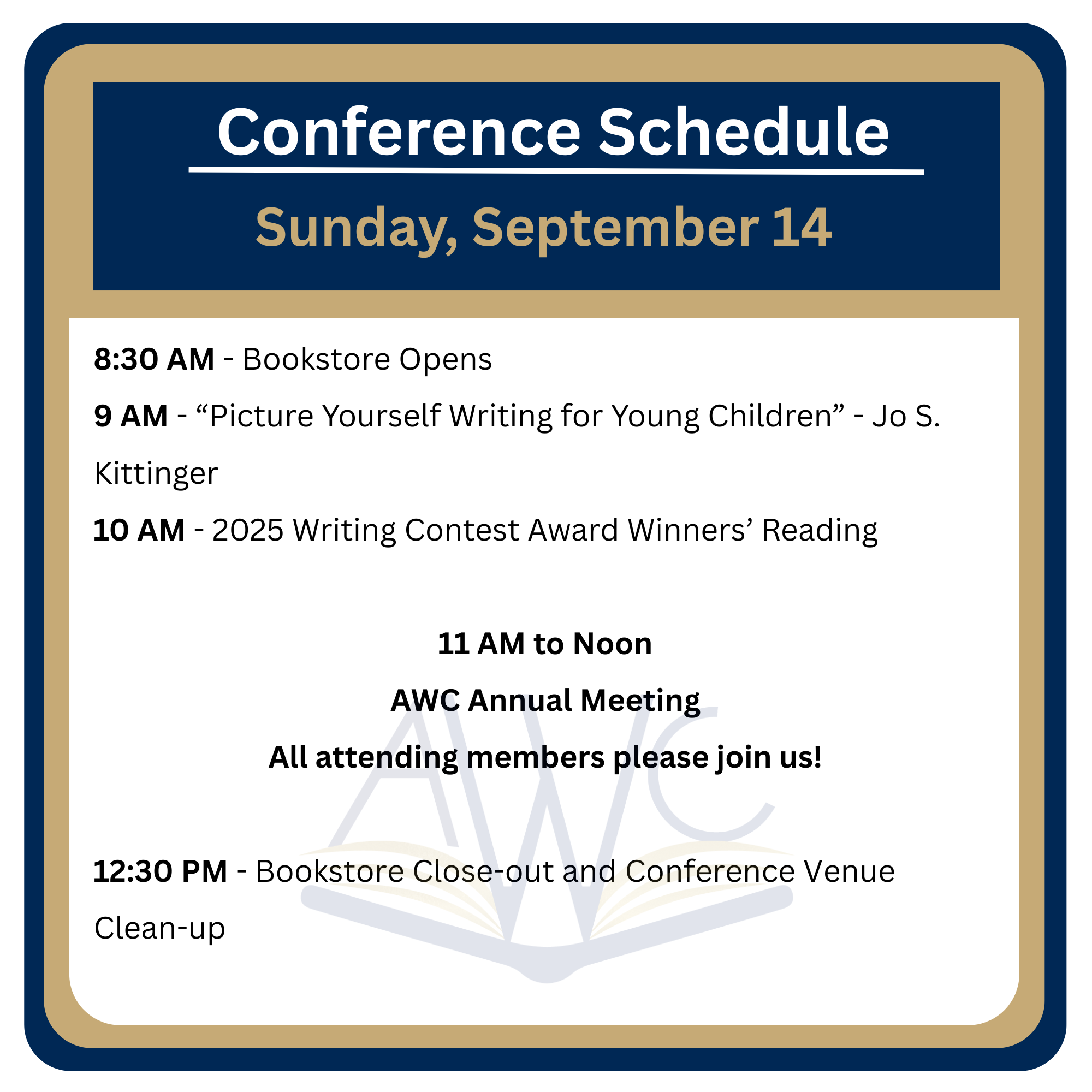Full Conference Schedule
Workshop descriptions
Saturday Banquet Keynote: "We can write about hard things: Addressing tough issues in fiction for young people" - Kerry Madden-Lunsford
“The Long and Short of Writing Fiction: How to write long, short, and sell it!” - Debra H. Goldstein and Valerie (V.M.) Burns
The elements needed to write novels or short stories. Finding markets for your work and selling it.
“Travel the Page: How to Structure Your Writing with a Road Trip” - H.M. Cotton
Itching to write something new but not sure how to approach it? Or trying to breathe life into an old piece of writing you keep stalling out on? This presentation will cover how to plan and accomplish your next writing project by using travel as a structural base. Conversation will take into consideration budget-friendly travel ideas alongside project goal-setting tips and tricks. You'll also hear one woman's account of how she accidentally committed herself to solo-kayaking 180 miles of Alabama's most bio-diverse river and lived to write the tale.
“Substack as a Place to Write Authentically” - Mary Dansak
What is this place called Substack, and why are so many writers headed there? In this presentation, we’ll cover some of the basics of this growing platform including the perks for both readers and writers. We will cover setting up your own Substack publication, focusing on writing bravely and authentically, and finding connections to others who share your passions. Bring your questions and ideas. What will you name your new Substack publication?
“Developing an Artist’s Statement - Focusing On Who We Are and What Impact We Seek as Writers” - Mike Turner
Who are you as a writer? What impact do you want your writing to have? What is its purpose? After your readers have finished reading your work, how do you want them to feel? What do you want them to do Answering these questions can do much to not only focus your writing efforts on these larger end goals, but also to further your promotional efforts to get your work in front of the audiences you want to reach.
In this discussion/workshop, poet/songwriter Mike Turner will give examples and tips to help you craft your own Artist’s Statement and explore how to use that statement in finding and connecting with the readers you want to be impacted by your writing.
“Putting It Out There: Cracking the Code to Literary Journals” - Jessica Temple and Halley (H.M.) Cotton
So you’ve poured your soul on the page, now what? This panel will discuss how to get your words out into the world and into the hands of readers. With a primary focus on literary magazines, experienced editors will guide participants through every part of the publishing process from choosing where to send work and crafting submission packets, to navigating publishing rights, and, yes, even the sting of rejection. Writers of all stages will have the chance to Q and A with the panelists and will come away confident and prepared to take on the literary submission process.
“Begin Where You Are: Establishing Sustainable Writing Practices” - Charlotte Donlon
“Begin Where You Are: Establishing Sustainable Writing Practices” invites writers to integrate their creativity with other areas of life by nurturing rhythms that fit their unique circumstances and callings. Drawing on insights from my spiritual direction practice and my forthcoming book, Spiritual Direction for Writers, participants will explore how their writing life is deeply connected to their sense of purpose and design practices that are both nourishing and sustainable. Through practical guidance and reflective prompts, attendees will discover how to honor their current realities and cultivate a fulfilling writing life, starting exactly where they are.
“Unearthing Alabama's Stories: Murder and the March Towards Justice” - Lesa Carnes Shaul and T.K. Thorne
Delve into the heart of our state's complex past! Two acclaimed authors unravel Alabama historical narratives: one, a chilling murder mystery that gripped a community, and the other, powerful accounts of the struggle for civil rights that shaped our nation. Shaul and Thorne share the research processes and compelling storytelling behind these nonfiction works, offering insights and inspiration for your own explorations of Alabama's rich and often challenging history.
“From Fact to Fiction: Using Nonfiction Research to Create Historical Fiction” - Richelle Putnam
This workshop teaches participants how to transform detailed historical research into compelling fictional stories. We focus on creating believable settings, intriguing characters, and a plot driven by real historical events while using creative writing techniques to ensure the story remains engaging.
Key elements:
- Turning nonfiction research into narrative-driven fiction.
- Crafting complex characters inspired by actual historical figures.
- Using historical events as the backdrop or catalyst for character development and plot.
- Includes writing prompts on the setting, character development, and plot integration.
“First-page critiques” - Roy Hoffman
Roy requests that participants write a brief summary of the novel, story, essay, etc., at the top of the page, just to contextualize the first page. He will talk about criteria for his critiques and give a couple of examples of strong first pages from literature.
“Picture Yourself Writing for Young Children” - Jo S. Kittinger
Picture books are a unique genre in the publishing industry. Your words will be completely dependent on the illustrations created to magnify it. (And you may have no say, whatsoever, in that art!)
Learn the ins and outs of creating picture book texts, and how to leave room for the illustrator. PBs have very specific guidelines you need to know so that you can ignore them with purpose!
“How to Create Compelling Settings” - Claire Datnow
The Setting establishes Mood and Atmosphere. Influences characters’ Behaviour and Choices. Drives the Plot. Enhances the Theme. Creates Conflict and Sensory Details. Claire will outline examples from specific books and genres.










